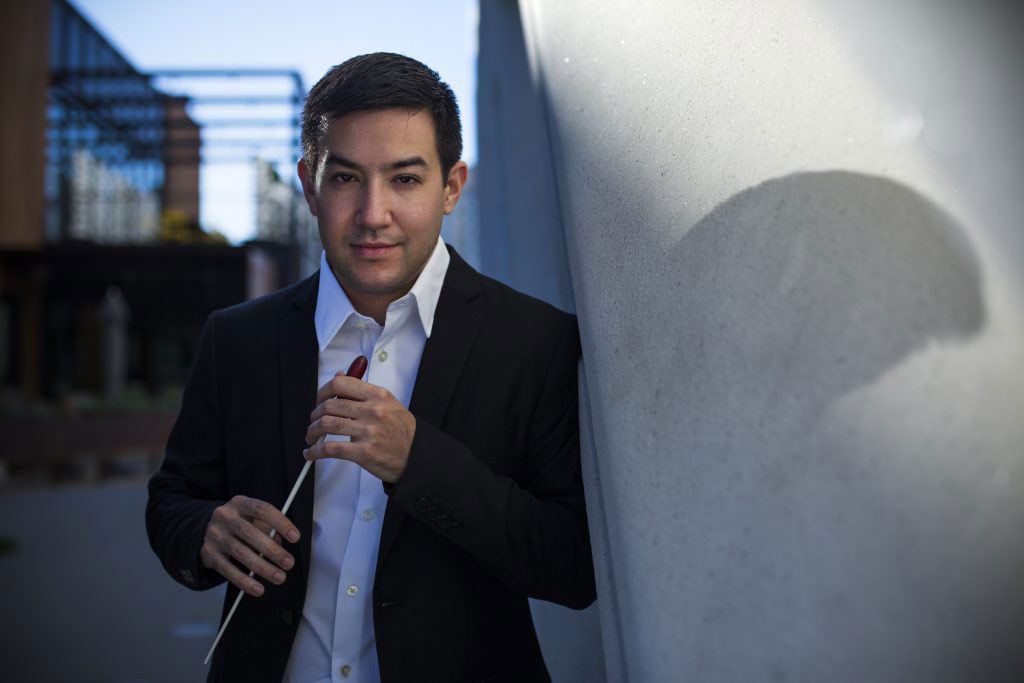Not all orchestra music directors live in the city where they conduct. Most have multiple gigs and spend much of their time on airplanes and in hotel rooms. But newly appointed Eugene Symphony music director Francesco Lecce-Chong decided to move here — during last month’s 107-degree heat wave, no less.
“You travel so much as a conductor anyway that you can pick your spot,” he explains. “It’s such a beautiful place, and when you’re starting a new job in a new place, you want to invest in it.”
Besides, it already feels like home. After a decade at East Coast conservatories (Mannes College of Music and Curtis Institute) and orchestras (assistant conductor at Milwaukee and Pittsburg symphonies), Eugene reminds him of another outdoor-friendly college town where he was born and raised — Boulder, Colorado — and where he started conducting youth orchestra at age 16. Even then, Lecce-Chong says, he admired how Eugene Symphony music director Marin Alsop took her other orchestra, the Colorado Symphony, from community ensemble to professional orchestra.
As a student, he encountered two of Alsop’s successors, Miguel Harth-Bedoya and Giancarlo Guerrero, who, like Alsop, went on to conduct prestigious orchestras. Both told him how valuable the ESO position had been for their development.
“They said that back before it was cool, Eugene was the only orchestra in the U.S. that was taking risks and picking young, first-time music directors and giving them space and support to grow,” Lecce-Chong recalls.
That put the ESO on his radar, and when Danail Rachev’s contract expired last year and the job opened up, Lecce-Chong went for it, beating out more than 250 other applicants. (He’ll keep his current assignments as assistant conductor of the Pittsburgh Symphony, with which he’s currently on a big European tour, and principal conductor of its youth orchestra, for the rest of this season.)
Lecce-Chong arrived to find Eugene Symphony’s current season already set (orchestras plan way ahead), so the coming year doesn’t really represent his own vision. However, he was able to make a few tweaks that reflect his priorities and offer insights into what lies ahead.
For example, the Feb. 15 program, which has a nature theme springing from Vivaldi’s famous Four Seasons violin concertos, originally boasted a couple of hoary classics. Lecce-Chong, who told EW during the audition process that “as a composer myself, I am passionate about supporting local and national composers,” thought the program needed something contemporary — and he had just the piece in mind.
Tumblebird Contrails, written by his friend and fellow former Curtis student Gabriella Smith (a rising star whose work impressed Portland audiences at last month’s Chamber Music Northwest) was inspired by the 26-year-old Bay Area-based composer’s hikes along the Pacific Crest Trail.
“We have a composer who’s hiked around the area, written a piece that describes what’s around here so beautifully, and it fits in the program thematically,” Lecce-Chong says.
It’s a sign of things to come. “I want to [program] Oregon composers and bring in all my young composer colleagues,” Lecce-Chong says. “The hardest part is finding ways to introduce them in the best possible light,” not just programming the usual brief “toss-aways” that allow orchestras to claim they’re doing today’s music while still filling the vast majority of actual performance minutes with old music by long-dead Europeans.
“You’ve given the audience permission to not take it seriously,” he said. “When people come to concerts we should be enriching, inspiring, creating dialogue.” That means devoting attention to how the music is presented and “approaching new music and American composers in a way that connects to audiences,” he explains.
Those who remember Alsop’s storied tenure will recall how she built a level of trust with Eugene audiences. “I think the most successful music directors are ones who develop a level of trust with their audience — a trust that the music on the program will be meaningful and memorable, even if they are unfamiliar with it,” Lecce-Chong says.
Building that trust happens not just on stage but also in the orchestra’s community and education programs, like ESO’s current Symphony Connect. It brings classical music to people unlikely to venture to the Hult Center, including students, low-income Oregonians and people with mental health issues.
Like many assistant conductors, Lecce-Chong, who was inspired by the broad audiences and high enthusiasm he experienced in leading this summer’s free Cuthbert concert, has advocated for such programs in his previous orchestras. The difference now is that he’s actually in charge.
“Artistic integrity and being in your community are the same thing,” he says. “You can’t have one without the other.”
